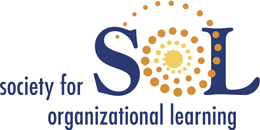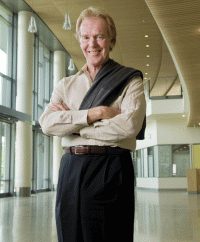
Questions for Society for Organizational Learning, Systems Thinking & Transformation
QuestionsForLiving interview with Peter Senge July 6th, 2012 regarding Society for Organizational Learning (SoL), systems thinking, and leading large-scale transformation.
QuestionsForLiving: Were there primary questions that guided, or attracted you to systems thinking, and your work with organizational development and strategy? If so, what were some of these questions?
Peter Senge: I was drawn to systems thinking way before I was interested in organizational development. The simplest answer to your question is that from a very early age, when I was a teenager, I was thinking a lot about what I saw, and still see, as a fundamental problem. Over time, we have built this extraordinary web of interconnectedness around the planet but we have no idea how to understand it, and we do not usually think about this interdependence when we make all kinds of key decisions. There is that gap between interdependence that we operate in, (energy would be a perfect example) and how we make decisions as consumers, producers and governments.
My primary question was, and largely still is: "How do we understand the interdependence that underlies our current way of living?"
QFL: Were there specific questions that influenced your desire to teach. If so, what were some of these questions?
Senge: I typically relate to the process more in terms of "sharing" rather than "teaching"; specifically I try to create an environment for people to share what is possible. I try to help people see not just what has been done before, but sharing what has been done, by suggestion, surfacing or eliciting what new might be possible. I think that is incredibly important. I have been very fortunate to have an extraordinary network of colleagues and organizations that I have worked with and who have helped me see possibilities along the way.
The other part of teaching is "capacity building" which is really quite central to all of our work. It is about people growing and developing as human beings and increasing our capacity to lead. Two primary questions regarding capacity building include: "What are the capacities that we need to be more effective as leaders for real systemic transformation?" and "How do I help myself and others in the ongoing process of developing those capacities?"
Teaching and learning is a process of inquiry and openness. Also, there is an aspect of fear in the learning process because the learner is discovering his or her own impediments and discovering their own blockages within themselves. I think that is the real edge or the real challenge - to stay in a really open stance through which you can see what is blocking your own energy or causing your own consciousness, or state of mind, to be functioning in a way that could be limiting what is possible.
QFL: Are there some core questions that you ask when developing new training programs and workshops to teach others to lead large-scale system change? If so what are these questions?
Senge: Some of the questions are basic such as: "What are people ready for?" and "What are the needs that people have?"
However, I think something exists a little bit in the background. In looking at the background, or context, I would say we are always focused on "What is the need of the larger whole?" or "What is the larger need?" If we are developing a program that involves cross-sector leadership or transformation, we could ask, "What are the needs of the private and public sectors?" "What are the fundamental gaps in leading that really are going to require a very strong level of commitment to build cross-sector leadership networks so that the leaders from different sectors will be ready to come together?"
When creating a specialized training, it is a process of really reflecting on “What are the big needs for the larger system?". Then you have to connect that up with the needs of people as they perceive them, or questions as people perceive them. That is really where the awareness of the market comes into play. The development of the programs focus initially a little more on the background and then the foreground.
QFL: Are there specific questions that you ask when creating and facilitating the Foundations for Leadership Program and/or Leading and Learning for Sustainability workshops to help participants maximize their personal development and growth?
Senge: For these courses the primary question is "How do we help people develop their own unique capacity as leaders?" This question has always been one of the key questions underlying most of our leadership courses.
QFL: What are the key questions that you encourage stakeholders to ask themselves when engaging in large-scale change initiatives?
Senge: For me, it always starts with "What do I, or what do we really care about?" and "What really matters to us?" This was the first big shift in our journey years ago. Keep in mind our journey was always learning about interdependence, but it became very clear early on that bringing about any kind of significant change could only really occur if there was something compelling. It's just not enough to identify a problem. A lot of people think that they can encourage people to change if they state that there is big enough problem. But I don't agree with that. We, as humans, have a tremendous ability for denial regarding all kinds of problems that we just don't want to face. However, as we get clear about something that really matters to us, we can orient to our passions, and our deepest curiosities, and our real aspirations. Then a lot can change and that can be a sustainable source of the change. This can influence the whole shift from desperation to aspiration and from problem-solving to creating. The question is very simple “What do we really care about, really care about?”
QFL: What were your primary questions for creating the Society for Organizational Learning and growing it into the organization that it has become today?
Senge: The primary question is "How can we foster collaboration?" SoL had, and still has, a series of learning communities. To help these communities thrive we asked "How do we create the best conditions, including the tools and methods, for enabling learning communities?" and "How do we go about enabling learning communities to build, form and stay connected with one another around the world?"
QFL: Were there primary questions that you asked yourself that influenced and shaped your book The Necessary Revolution? If so, what were some of these questions?
Senge: The work goes back about ten years prior to the publication. So the kind of questions we asked were really guided by the questions "How do businesses experience fundamental shifts in their environment, particularly around social and environmental challenges that become more and more prominent?", "How can these shifts become a strategic opportunity for the business, without trivializing the problems?" Some companies try to make money selling "environmental products" or "solutions" which trivialize the problem. However, some companies engage in a true positive transformation. I suggest the following questions, "What is the opportunity for the conscientious citizen?" "What are the leadership processes that will help businesses really see and move forward toward the future that they really want to create?" Over time those questions expanded to include the NGO section because we learned that a lot of the problems need to be addressed cross-sector with businesses and civil society and government working together. This resulted in asking the question, "How do you build collaborative leadership networks, commensurate to the complexity of the problem?" Generally speaking, the problems are a lot more complex than the institutional arrangements that mobilize to solve them.
QFL: Are there several universal / overarching questions that you have asked yourself that contributed to your success in leading positive change and transformation within large organizations?
Senge: I would say my primary questions are "How do I use my time best?", "What are the most important things that I could be doing?" What goes with that, but is a separate part is my own personal development. I often ask "What are the next steps for my own development that will enable me to be effective doing the things that I really should be doing?"
QFL: What are the questions that guide your work today and may guide your work going forward?
Senge: The big one, I would say is: "How do we work together to live in harmony; harmony with one another and harmony with Mother Earth and as human beings?"
There are periods of time in particular cultures and in particular societies, though the vast majority are quite unsustainable, where there are examples of sustainability. When a sustainable or harmonious culture can be found, it's always in a particular local geographical or ecological niche. We can't stay on the current trajectory we're on with the earth and our current systems. So I ask, "How do we learn to live in harmony with one another and Mother Earth at the level of the whole?"
All the evidence today suggests that we can't and won't remain on the same path and that we will go into some sort of collapsed mode that will bring us back down to trying to do this at a more local level. It remains to be seen if it can or can't be done.
QFL: What questions do you think people should ask themselves to make the world a happier and healthier place?
Senge: It's pretty simple, I would start with two questions: "What is the world that you want your children and grandchildren to live in?" and "Are we headed towards that world? Or if not, what do we need to change?"
For more information regarding SoL's courses and programs including:
- Executive Champions' Workshop Aug. 14 (dinner) - 17 (3 p.m.), 2012 - Stowe, VT
- Foundations for Leadership - Sept. 12 - 14, 2012 - Bedford, MA
- Leading and Learning for Sustainability - Nov. 7 - 9, 2012 - Bedford, MA
For a additional information regarding workshops, please contact Lisa Kim by phone: 617-300-9560 or email: lisa@solonline.org.
For a brief video of Peter speaking about the programs, please click here: http://www.solonline.org/?CoursesPrograms
For more information regarding Peter Senge & the Society For Organizational Learning, please visit:
Peter Senge
Bio
Peter Senge, PhD, Senior Lecturer, Sloan School of Management, Massachusetts Institute of Technology, and Founding Chair of the Society for Organizational Learning (SoL), a global network of people and institutions working together for systemic change. His work centers on promoting shared understanding of complex issues and shared leadership for creating healthier human systems. Today, this involves major cross-sector collaborative projects focused on global food systems, climate change, circular (zero waste) business models and regenerative economies, and youth leadership and the future of education.
Peter is the author of The Fifth Discipline: The Art and Practice of the Learning Organization (over two million copies sold worldwide), co-author of the three related fieldbooks, Presence: An Exploration of Profound Change in People, Society, and Organizations and most recently, The Necessary Revolution: How Individuals and Organizations are Working Together to Create a Sustainable World. The Fifth Discipline was recognized by Harvard Business Review as “one of the seminal management books of the last 75 years,” and by the Financial Times as one of five “most important” management books. The Journal of Business Strategy named him as one of the 24 people who had the greatest influence on business strategy in the 20th century.. Peter has a bachelor’s degree from Stanford University (where he received the F.E. Terman senior engineering award) and a Masters and Ph.D. from MIT.
Homepage
http://www.solonline.org


